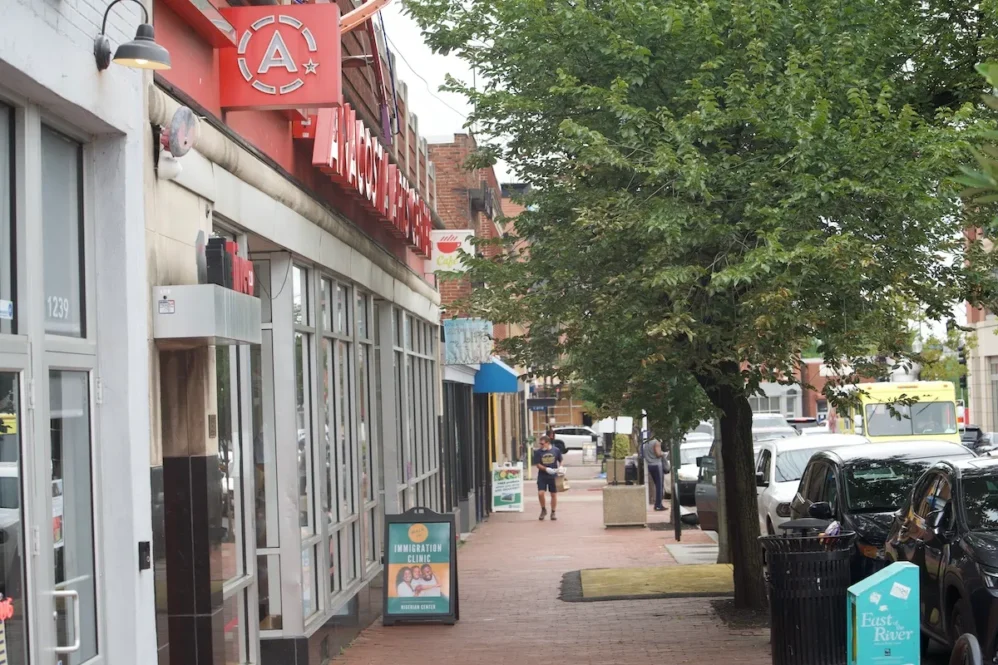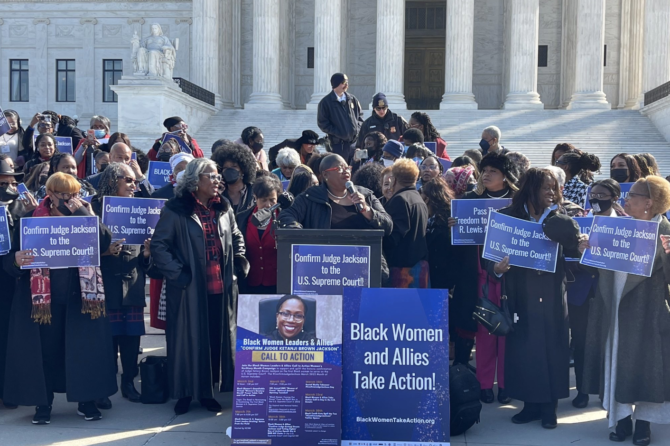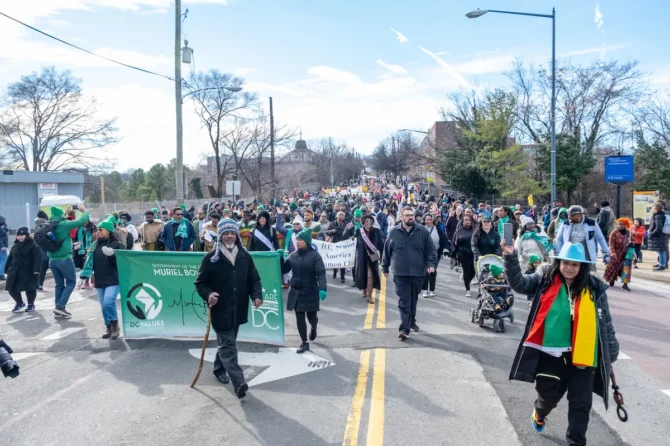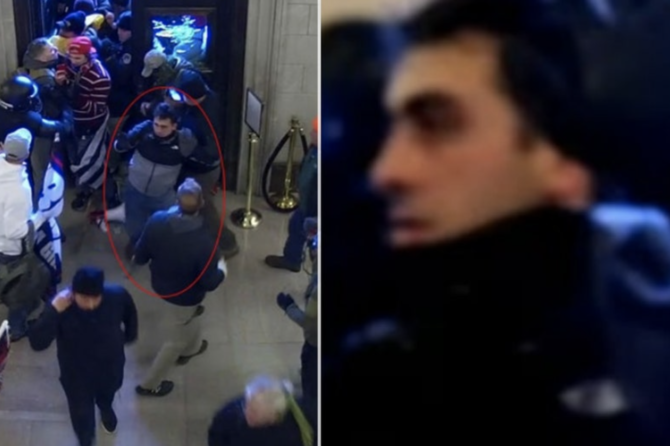WASHINGTON INFORMER:In the aftermath of a shooting that left three people dead along Good Hope Road in Southeast, D.C. Council member Trayon White (D-Ward 8) said he’s reached the height of frustration with those who continue to perpetrate violence in his ward.
So much so, that he has recommended the dispatch of the D.C. National Guard, even going as far as contacting D.C. Mayor Muriel Bowser (D) and acting Metropolitan Police Chief Pamela Smith about the matter.
Even with what some consider such an egregious request, White hasn’t lightened up on his calls for what he believes Ward 8 residents, particularly those living near Good Hope Road, deserve. He said those services include fully engaged police officers, adequate outdoor lighting, clean streets, the removal of what was supposed to be a temporary methadone clinic, and the installment of a proximate recreation center.
“Ten of our recreation centers have been closed and we have the most children and most indigenous Blacks left in the city,” White said. “We’re not doing enough to fortify indigenous Black residents. A few small residents are wreaking havoc. If they don’t suffer the consequences, they’ll do the same thing over and over again.”
Years of Meetings, Community Walks and Emails — With Little to No Progress
In total, seven people across the District died on Aug. 5 from gun violence. That night, on the 1600 block of Good Hope Road in Southeast, Tymea Cook, 27, Bernard Hodges, 35, and Reginald Gilbert, 34, lost their lives.
According to MPD, more than a dozen people have been killed in the District during the month of August so far. In Police Service Area 701, where Cook, Hodges and Gilbert were killed, MPD has also reported more than 30 violent crimes involving guns so far this year.

Overall, as of Aug. 9, the number of reports about violent crime in that particular jurisdiction is approaching 200.
For Advisory Neighborhood Commissioner Jamila White, those numbers aren’t by happenstance. She said District agencies lack the collective will to curb substance use, which to some degree would slow drug trafficking and the violence that accompanies it.
In making her point, Commissioner White points to the bevy of drug treatment centers on Good Hope Road she said don’t conduct community outreach. She added that once they come of their own volition, a significant portion of substance users find out they don’t have the proper insurance to access programs.
As Advisory Neighborhood Commission (ANC) 8A continues to wait for resources, White’s constituents increasingly complain about substance users flooding street corners, hiding in backyards, making noises at night, and engaging in sexual activity near schools and daycare centers. In conversations with the Mayor’s Office of Community Relations and Services, residents listed homeownership opportunities for middle and working-class residents, green space, literacy and job readiness, guaranteed income and jobs, senior wellness and public safety among their greatest priorities.
Meanwhile, ANC 8A tackles ongoing issues on Good Hope Road from various angles. Earlier this year, the commission submitted a resolution to include the transfer of the BHG Washington DC Treatment Center from 1320 Good Hope Road SE to the campus of United Medical Center (UMC) on Southern Avenue in the fiscal year 2024 budget.
In an email to D.C. Council Chairman Phil Mendelson (D), Commissioner White noted that the clinic’s removal would boost the spirit of a corridor soon to be named in honor of D.C. Mayor Marion S. Barry, Jr. Other budget season requests centered on a $10 million investment in Good Hope Road for the acquisition of vacant commercial space for Ward 8 small businesses and support for substance users, unhoused residents and sex workers.
Soon after Commissioner White’s letter, UMC’s board conducted a meeting about the feasibility of the move. The Informer unsuccessfully attempted to gather comment from UMC about how board members have further explored ANC 8A’s endeavor.
As it relates to Good Hope Road, Commissioner White said her budget season requests counted among the latest of several since the pandemic to fall on deaf ears.
During the latter part of 2020 and well into 2021, ANC 8A, of which White is the chair, protested the renewal of a liquor license for New Seven Market, the site of robberies, fights and substance use over the course of several years. ANC 8A alleged that, during its 2014 and 2019 renewals, the owners of New Seven Market submitted a forged letter of support from ANC 8A to what’s now called Alcoholic Beverages and Cannabis Administration.
Concerned Residents Against Violence (CRAV) later joined ANC 8A’s fight in the aftermath of a deadly shooting that took place in front of New Seven Market.
Later, in the fall of 2021, Commissioner White reached out to Bill Turnage, D.C. deputy mayor for health and human services, and Dr. Barbara Bazron, director of D.C. Department of Behavioral Health (DBH), about the development of an 18-month targeted action plan that addresses the overt substance use between the 1200 and 1800 blocks of Good Hope Road in Southeast.
Commissioner White implored Turnage and Bazron to design a plan that addresses what she designated as other root causes of substance abuse and violent crime on Good Hope Road. Elements she suggested for the plan included a sobering van, connection to rapid rehousing, and collaborations with surrounding businesses for workforce development.
As expressed in an email forwarded to The Informer, White requested that the plan be carried out without criminalizing substance users. She also circled back on what had been an ongoing movement to secure the transfer of BHG Washington DC Treatment Center to UMC.
Following her exchange with Turnage and Bazron, Commissioner White attended an October 2021 community meeting with Ward 8 Council member White, D.C. Council member Anita Bonds (D-At Large) and members of Building Blocks about the violence ravaging Good Hope Road.
In a communique with then-Deputy Mayor for Public Safety Chris Geldart and then-Building Blocks Director the late Linda Harlee Harper, Commissioner White asked about their progress on an updated Building Blocks plan for Good Hope Road, 16th Street, Galen Terrace, Cedar Heights and Frederick Douglass Apartments. Earlier that year, ANC 8A had met with Mendelson, Council member Christina Henderson (I-At Large) and D.C. Council member Robert White (D-At-large) about conditions on Good Hope Road.
In her email, White said residents lost confidence in Building Blocks, the Bowser administration’s interagency violence prevention apparatus, amid what seemed like a lack of progress in addressing gun violence, illegal dumping, substance abuse, and homelessness.
During the latter part of 2021, Commissioner White attended another meeting with DBH and a local teacher with the understanding that the agency would draft an interagency plan for Good Hope Road that could be executed within the first quarter of 2022. Preparation for the development of that plan would include a walk-through of Good Hope Road and nearby Minnesota Avenue with Bowser.
Commissioner White said neither that plan nor the plan requested of Building Blocks came to fruition.
During the earlier part of 2022, Bowser joined ANC 8A on a call where participants discussed public safety on Good Hope Road and the presence of the methadone clinic between 13th and 14th streets. Later that year, after the Office of the Deputy Mayor of Planning and Economic Development met with ANC 8A, plans gelled together for a mayoral walkthrough of Good Hope Road and Minnesota Avenue that would take place this past January.
Weeks before Bowser even set foot on Good Hope Road, one of Commissioner White’s constituents almost became the unintended victim of a drive-by shooting.
On Dec. 22, 2023, White sent Harper, then-MPD Seventh District Commander John Branch and MPD Captain Michael Hamelin an email that included her constituent’s depiction of that night — including the shattering of the constituent’s car window by a bullet.
With the latest episode of gun violence to rock Good Hope Road, Commissioner White said there’s no room for blaming residents if the D.C. government as a whole isn’t being held accountable to improving residents’ access to basic amenities.
She told The Informer that it’s very likely that Ward 8 Council member White has similar feelings.
“At this point, people have given up hope,” Commissioner White said. “They say they want to lock everyone up and start fresh but this is the manifestation of that [from] more than 20 years ago.”
DBH didn’t return The Informer’s email requesting an update about its interagency public health strategy for 1200-1800 Good Hope Road SE.
In a statement, a D.C. Office of the City Administrator (OCA) spokesperson said OCA fenced off the parking lot of the Capitol Hill Boys Club Artist Gallery on the 1600 block of Good Hope Road where drug transactions took place. They also cited monitoring of methadone clinic compliance by DBH and DC Health, along with the D.C. Office of Neighborhood and Safety Engagement and D.C. Office of Gun Violence Prevention’s work in the violence prevention space.
“We will continue our collaborative efforts to make Good Hope Road safe and eradicate the health and public safety issues our residents are facing,” the spokesperson said.
Council Member White, Others Reflect on Current State of Affairs
On the afternoon of Aug. 8, Ward 8 Council member White returned to the 1600 block of Good Hope Road in Southeast where Cool, Hodges and Gilbert took their last breaths. Surrounding him at the podium were Tempie Satcher, Hodges’ mother, along with mothers and family members of those who lost their lives to gun violence.
For nearly two hours, Council member White spoke before community members in the parking lot of the Capitol Hill Boys Club Artist Gallery about the recent shootings and what he designated as the underlying causes.
Frustrated community members pointed to the exclusion of Black people from construction jobs in Ward 8. Others mentioned lackadaisical parents and disengaged police officers.
At one point, someone pointed to incessant prayer without tangible efforts to change conditions as a major problem.
In his remarks, White called Ward 8 a war zone. He noted that gun violence erupts at various times of the day and night. He even, as he has done on other occasions, recounted instances when he arrived at crime scenes littered with more than a hundred shell casings.
A public safety summit convened by Bowser earlier this year that included White and other city officials focused, in part, on illegal guns, ghost guns and glock switches. Data compiled by the Bureau of Alcohol, Tobacco, Firearms and Explosives identified Maryland, Virginia, North Carolina, Georgia, South Carolina and West Virginia as the top outside source states for guns recovered in D.C.
While he expressed his disdain for the proliferation of guns, White didn’t respond to The Informer’s questions about his engagement with MPD and Lindsey Appiah, D.C. deputy mayor for public safety and justice, about the issue. He also didn’t respond to an inquiry about how he plans to legislatively address the flow of guns upon the D.C. Council’s return from summer recess.
At the time of his death, Hodges was serving as an HVAC engineer at MGM National Harbor Hotel & Casino in Oxon Hill, Maryland, among other establishments. Years earlier, he facilitated a truce between warring factions in the area surrounding Good Hope Road.
Hodges also ushered a call for a recreation center in Anacostia while walking with White and Anacostia residents years ago. On Tuesday, White said the groundbreaking for that recreation center is scheduled for Aug. 21. In a tribute to her son, Satcher called for the recreation center to be named in his honor.
“Bernard Hodges knew the Lord and he believed in knowledge and education,” Satcher said as she implored the men in her community to stop the violence. “He was not just anybody. Stop it, Black men. You are doing what [the system] needs you to do. It’s so cowardly to pick up a gun. We are not targets. We have to keep producing.”










